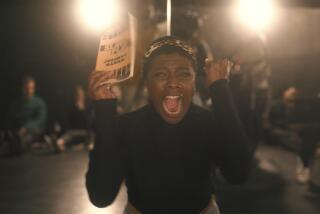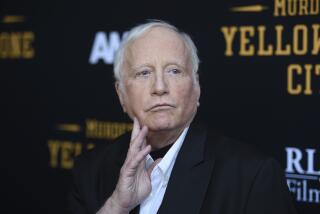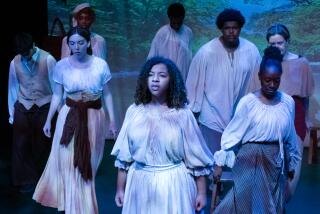Roland Emmerich’s ‘Anonymous’ shakes up Shakespeare scholars
- Share via
A statue of William Shakespeare in the playwright’s hometown of Stratford-Upon-Avon was covered by a sheet Tuesday in protest; a debate enlivened a New York cultural festival; American university campuses have played host to surprisingly prickly encounters between professors and filmmakers.
“One professor in Berkeley called us ‘characters,’” said Roland Emmerich, the movie director at the center of the controversy. Emmerich’s film, “Anonymous,” depicts Shakespeare, played by Rafe Spall, as a barely literate actor providing a front for a brilliant nobleman, Edward de Vere, the Earl of Oxford (Rhys Ifans), the secret author of the plays. The film, which opens Friday, has provoked a testy reaction from some in the typically genteel community of literary scholars. The crux of the dispute is whether Shakespeare, with a grammar-school education, could have written works with the breadth and depth of “Hamlet,” “Romeo and Juliet” and “Macbeth.”
“Scholars have not been debating this question,” said Michael Witmore, director of the Folger Shakespeare Library in Washington, D.C., the largest collection of materials on the playwright’s life and theatrical career. “This was a man who knew about history, warfare, theology, travel, courtship, flowers. Some of it was experience, some of it was reading. It’s astonishing that anyone could have produced a body of work this powerful — noble or commoner — but there’s no new evidence that suddenly says to us, oh, everything else we thought was wrong.”
“This film tells me very little about Shakespeare’s England,” said James Shapiro a professor of English and comparative literature at Columbia University and author of the book “Contested Will: Who Wrote Shakespeare?” “It tells me about Sony Pictures and Hollywood culture.... It really suits our cultural moment, and that’s one in which faith-based arguments should be taken as seriously as those grounded in fact. The fantasy that ‘Midsummer Night’s Dream’ was written by and starred a 9-year-old? I don’t think there were Tiger Moms then. That’s the level of fantasy that’s trying to pitch itself as a possible reality in this movie. It’s a hilarious and counter-factual presentation.”
While most Shakespeare scholars don’t take the Oxfordian theory seriously, plenty of other smart people have over the decades, including Mark Twain, Sigmund Freud and Supreme Court Justice Antonin Scalia.
Screenwriter John Orloff first wrote his script more than a decade ago, after seeing a TV special about the Shakespeare authorship question. “Shakespeare is one of the very few common cultural touchstones in Western education,” Orloff said. “Pretty much everybody is forced to read ‘Romeo and Juliet’ at some point. We end up having a very personal relationship with him.” The script earned Orloff an agent and a job writing on HBO’s World War II miniseries “Band of Brothers,” but didn’t get made, he said, because another quasi-biographical movie about the Bard of Avon, “Shakespeare in Love,” beat it to theaters.
“Any time I’d go into a meeting, I’d start talking about my 16th century Elizabethan melodrama,” said Orloff. “One day I was sitting in Roland Emmerich’s office, and his eyes didn’t glaze over.”
Emmerich, better known for big-budget disaster movies such as “Independence Day” and “2012,” said he was attracted by the chance to tell a story about art and power. The German director injected a layer of conspiracy into the script — the notion that plays like ‘Richard III’ were written for the purpose of influencing Elizabethan court politics. He cast all-English actors and, in order to deliver “Anonymous” to distributor Sony Pictures for less than $30 million, relied on visual effects to create a sweeping shot of thousands of Londoners outside the Globe theater, and aerial views of key locations like the Tower of London, London Bridge and Queen Elizabeth I’s Whitehall Palace.
It wasn’t until Emmerich and Orloff embarked on a promotional tour of college campuses and film festivals last month that they realized just how provocative “Anonymous” would be.
“It gets ugly,” Emmerich said. “Most of the people who yell the loudest are scholars. They have the most to lose.... If you wrote two books about a man who may have been a fraud, you would be upset too. Whenever I debate I say ‘Look, this is art. Art should provoke. And here we are discussing a movie, in a hopefully scholarly way.”
The Shakespeare Birthplace Trust covered over pub and street signs in the writer’s home county of Warwickshire to denounce the movie’s London Film Festival premiere this week, and the Shakespeare Center of Los Angeles, which presented Emmerich with its Crystal Quill Award, took heat for acknowledging a movie that discredits its namesake poet. “I started getting hate mail,” said the Shakespeare Center’s founding artistic director, Ben Donenberg, when introducing the movie at a screening Oct. 4. “How dare we take this on? This film … will only propel the debate.”
Shapiro, the Columbia Shakespeare expert who tangled with Emmerich after a screening of “Anonymous” at the New Yorker Festival last month, finds nearly as egregious the film’s portrayal of Elizabeth I (who is played by mother-daughter acting team Vanessa Redgrave and Joely Richardson at different times of her life) as politically weak and privately randy.
“Queen Elizabeth was really a pretty remarkable monarch, who managed the male courtiers around her brilliantly,” Shapiro said. “To turn her into someone who can’t keep her legs together or her head on straight…”
He admits some frustration with the debate: “I start to sound pretty cranky.”
If Shakespeare scholars are atwitter about “Anonymous,” general audiences have shown little curiosity in tracking surveys, prompting Sony Pictures to scale back its originally planned wide release to 250 theaters. Instead, the studio hopes to slowly build buzz based on reviews and word of mouth.
Witmore, who had an enthusiastic group of Oxfordians visiting his library two weeks ago, plans to go.
“I’m looking forward to seeing CGI 16th century London,” he said. “I’ve spent most of my life wondering what that’s like. I’m not going go to the film to learn the truth about who wrote the plays.”
rebecca.keegan @latimes.com
More to Read
The biggest entertainment stories
Get our big stories about Hollywood, film, television, music, arts, culture and more right in your inbox as soon as they publish.
You may occasionally receive promotional content from the Los Angeles Times.











